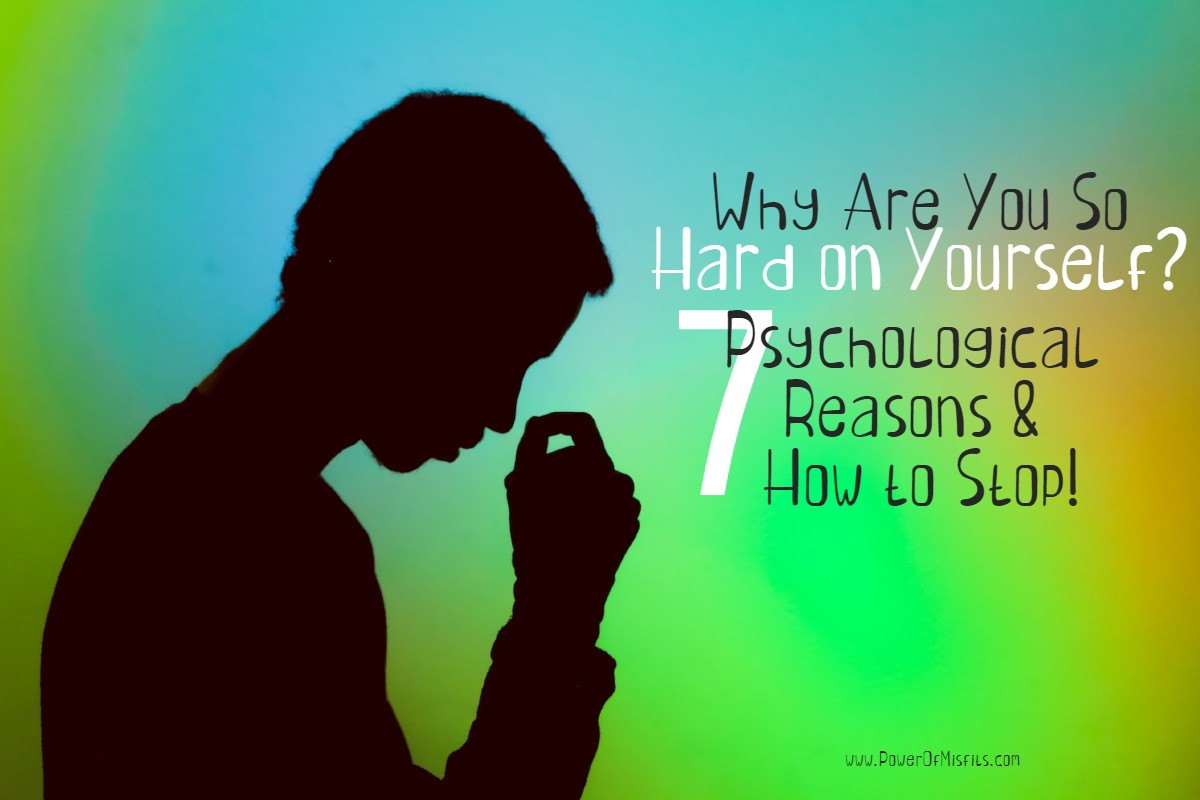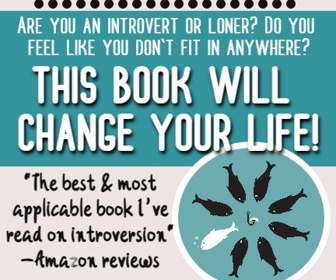Sometimes I criticize myself for the most insignificant failures. That’s when I wonder,
Why am I so hard on myself? Why do I stress over such a minor mistake? It won’t even matter tomorrow!
This helps me see the situation in a more realistic light and stop beating myself up.
If you have this problem too, let’s talk about the psychological reasons for being hard on yourself.
Why Am I So Hard on Myself? 7 Reasons, According to Psychology
1. You have self-esteem issues
The most obvious reason behind self-criticism is low self-esteem. Studies demonstrate a clear link between the two.
When you are convinced that you are not good enough, you tend to focus too much on your flaws and mistakes. You see yourself in a negative light, and you are never satisfied.
Be it your performance at work or your approach to parenting—it’s never good enough. Because in your eyes, you are never good enough.
Damaged self-esteem makes us focus on our flaws and forget about our good sides.
2. You were criticized a lot as a child
A key reason of being hard on yourself is the way your caregivers treated you when you were a child.
If your parents were overly critical, you learned from an early age that whatever you did, it was never good enough. It’s especially true if your parents used harsh language while criticizing you.
You grew up believing that you are worthless and doomed to fail, no matter what you accomplish. Even if you were a diligent student and a well-behaved kid, your parents never recognized it.
A lack of praise paired with regular criticism from your parents is a possible reason you are too hard on yourself. A study found that the participants with higher levels of self-criticism reported worse relationships with their mothers during their childhood.
3. You are a perfectionist
Life is hard when you are a perfectionist. You are almost never satisfied with your accomplishments and you struggle to feel happy with your life in general.
A perfectionist’s mind is wired to focus on failures and flaws, so it’s no surprise that people with such tendencies are hard on themselves. Research found that maladaptive perfectionists scored higher on self-critical depression.
You want everything to be flawless—be it a report at work or your relationship with your significant other. This pursuit of perfection can leave you beating yourself up over the smallest mistake.
So, if you are wondering,
Why am I so hard on myself?
Maybe you should also ask yourself,
Am I taking it too far? Is my perfectionism ruining my life?
4. You have faced high family expectations

Sometimes you come from a family that sets too high standards. Your parents were not necessarily overly critical—maybe they were just too demanding. It often happens in families of high achievers and highly intelligent people.
Research shows that wealthier families tend to have higher expectations for their children’s academic performance.
For example, both your parents were doctors, and you were expected to become one too. So, when it turned out that you wanted to follow a completely different path, they were deeply disappointed with your choice.
As a result, you felt like a failure. You failed your parents and ruined all those beautiful things they planned for you.
High family expectations is one of the common psychological reasons for being hard on yourself.
5. You endured abuse
Childhood abuse has long-lasting consequences, including damaged self-esteem and difficulty maintaining healthy relationships. Among others, it can also lead to toxic shame and harsh self-criticism.
For example, one study found that the participants who had endured emotional abuse in childhood scored higher on self-criticism and social anxiety symptoms.
Small children are egocentric – they believe that everything revolves around them. For this reason, they can’t understand that abuse is not their fault. Therefore, if you were maltreated as a child, you may have formed a subconscious belief that you are worthless.
That’s why you are so hard on yourself. Your self-worth is damaged as a result of childhood trauma, so you find it difficult to feel good about yourself.
6. You over-analyze yourself
Some psychologists believe that self-absorption is the key to most mental health issues.
When I say ‘self-absorbed’, you may imagine someone who is egocentric and overly confident. However, self-absorption is not always positive. It doesn’t always make you feel invincible and better than everyone else.
Sometimes it does quite the opposite. You may be so absorbed in your own feelings and thoughts that you constantly find something to beat yourself up over. As a result, you dwell on the most insignificant episodes of your past.
For example, introverts are often hard on themselves for this very reason—they are intrinsically more focused on their inner world than extroverts. This also means that they are more likely to over-analyze themselves and dwell on self-criticism.
As for me, I know that being an overthinking introvert is the main reason I’m so hard on myself sometimes.
7. You suffer from mental health issues
When I suffered from anxiety, I would often beat myself up over totally insignificant things. Sometimes these things were just a product of my imagination. That’s when I would catch myself thinking,
Why am I so hard on myself? I didn’t do anything wrong, so why am I feeling like a total failure?
This is what mental disorders such as depression and anxiety do—they trick you into feeling worthless and believing that you do everything wrong. They are huge liars that fuel your inner critic and fill your mind with self-deprecating thoughts.
Research confirms the link between self-criticism and depression.
How to Stop Being Hard on Yourself?

1. Practice self-compassion
Experiments show that self-compassion helps reduce the negative effects of shame and self-criticism. So, how to practice it?
It’s simple: you need to be kinder to yourself. Be careful about how you talk to yourself. Don’t let your inner critic say nasty things and call you names. Instead, say a couple of nice, comforting, and encouraging things to yourself, as if you were talking to a child.
There is also an effective psychological trick. Write a letter to a person you love—for example, your best friend or significant other. Write down the reasons you love and appreciate him/her. Comfort them for what they are going through right now.
When you are done, change your friend’s name to your name and read the letter aloud. It will feel like a loving friend is comforting you.
2. Practice self-praise
Self-praise is another remedy for being hard on yourself. Even when everything is falling apart and you feel like your life is a total failure, I’m sure that you can recall a few accomplishments that make you proud.
These accomplishments don’t have to be big—maybe it’s a small act of kindness you did today or an academic achievement you had fifteen years ago. Recall it in every detail and immerse yourself in the nice feeling you experienced at that moment.
You can also make a list of your past achievements and re-read it every time you are too hard on yourself. And, of course, don’t forget to praise yourself every time you do a great job. Maybe it’s nothing significant—you remained calm during an argument at work or helped a friend who needed you. Things like this still matter for your sense of self-worth.
After all, the goal of self-praise is to shift your attention from your flaws and failures to your assets and accomplishments. This is exactly what you need to stop being so hard on yourself.
3. Challenge your inner critic
Don’t let your inner critic be in charge. The key problem with self-criticism is that we often dwell on it. So, if you want to know how to stop being so hard on yourself, you need to silence your inner critic.
First of all, you need to watch for your thoughts and learn to recognize negative self-talk. The next step is to challenge it.
When you hear that nasty little voice in your head, reply with a positive statement about yourself. For example,
-You are so useless!
-No, I am capable. I’m a good employee. I have achieved so many things.
Check this guide for more affirmations for self-esteem.
4. Stay away from negative people and comparisons

There are certain things and people that fuel self-criticism.
For example, you may hang out with someone who is judgmental and negative. So, whenever you talk about your plans or dreams, they make fun of you. They convince you that it’s not going to work out, and you gotta be more realistic. Maybe they also criticize your decisions or give you advice you didn’t ask for.
As a result, you feel like a fool. Spending time with judgmental people can fuel your inner critic. So, if you have a tendency to be too hard on yourself, the best decision is to distance yourself from such personalities.
The same happens if you have the toxic habit of comparing yourself to others. Your life never feels as good as other people’s, especially if you only know the superficial side of their lives.
Unhealthy comparisons have become a real problem in our age of social media obsession. Everyone is busy showcasing a perfect image online, so some of us may be fooled into believing that other people’s lives are indeed that great.
In reality, they are not. Don’t waste your time comparing yourself to others. You don’t know the whole truth about what they are going through. Even if it seems that someone else has achieved much more than you did, you never know what sacrifices they had to make.
So, ask yourself,
Why am I so hard on myself? Is it because I’m striving to be like someone else? Am I chasing other people’s dreams?
Remember that everyone has their path in life, so following someone else’ footsteps is not going to bring you happiness. You need to discover your own path. And you can achieve it only if you stay true to yourself.



